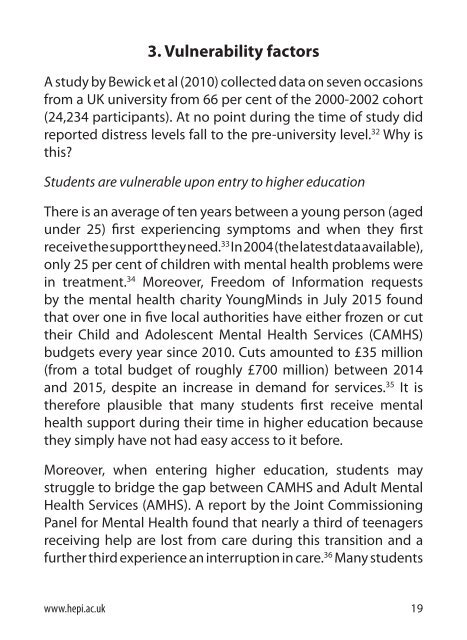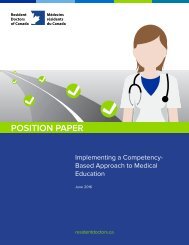The invisible problem? Improving students’ mental health
2cU9ATf
2cU9ATf
Create successful ePaper yourself
Turn your PDF publications into a flip-book with our unique Google optimized e-Paper software.
3. Vulnerability factors<br />
A study by Bewick et al (2010) collected data on seven occasions<br />
from a UK university from 66 per cent of the 2000-2002 cohort<br />
(24,234 participants). At no point during the time of study did<br />
reported distress levels fall to the pre-university level. 32 Why is<br />
this?<br />
Students are vulnerable upon entry to higher education<br />
<strong>The</strong>re is an average of ten years between a young person (aged<br />
under 25) first experiencing symptoms and when they first<br />
receive the support they need. 33 In 2004 (the latest data available),<br />
only 25 per cent of children with <strong>mental</strong> <strong>health</strong> <strong>problem</strong>s were<br />
in treatment. 34 Moreover, Freedom of Information requests<br />
by the <strong>mental</strong> <strong>health</strong> charity YoungMinds in July 2015 found<br />
that over one in five local authorities have either frozen or cut<br />
their Child and Adolescent Mental Health Services (CAMHS)<br />
budgets every year since 2010. Cuts amounted to £35 million<br />
(from a total budget of roughly £700 million) between 2014<br />
and 2015, despite an increase in demand for services. 35 It is<br />
therefore plausible that many students first receive <strong>mental</strong><br />
<strong>health</strong> support during their time in higher education because<br />
they simply have not had easy access to it before.<br />
Moreover, when entering higher education, students may<br />
struggle to bridge the gap between CAMHS and Adult Mental<br />
Health Services (AMHS). A report by the Joint Commissioning<br />
Panel for Mental Health found that nearly a third of teenagers<br />
receiving help are lost from care during this transition and a<br />
further third experience an interruption in care. 36 Many students<br />
www.hepi.ac.uk 19





